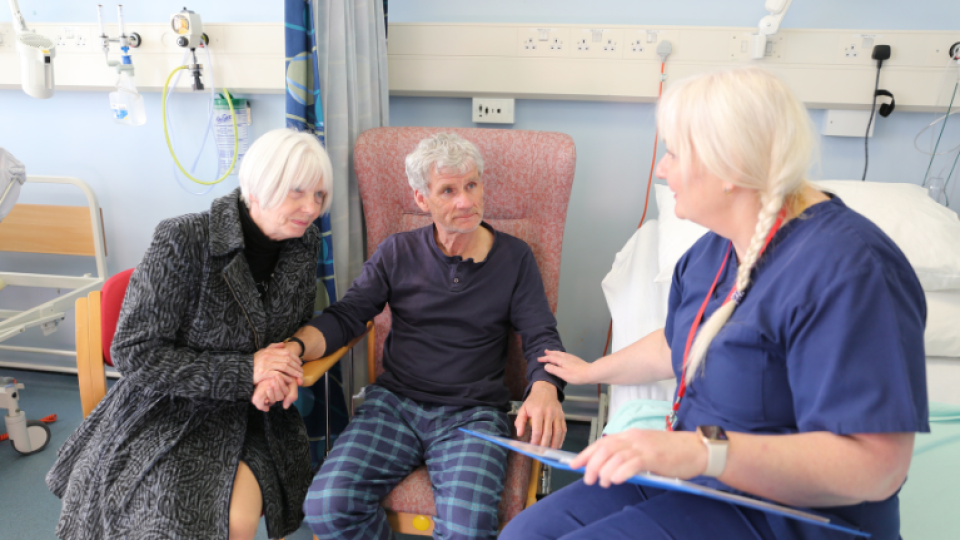
Ground-breaking research into the experiences of people with dementia on mental health wards underway
Intro
A 30-month research project investigating the experiences of people with dementia admitted to mental health wards will look to transform the care that future patients receive.
Up to 90% of people with dementia experience behavioural and psychological symptoms, including depression, anxiety, sleep disturbances, and agitation. For those experiencing significant distress, specialised mental health care may be necessary.
Main body
The study - Family Interventions in Mental Health Environments - also known as FIND ME, has been launched by the University of West London in partnership with Dementia UK, the specialist dementia nursing charity, and funded by the National Institute for Health Research (NIHR). It aims to promote partnership between wards and families to improve the quality of care for people with dementia and will be delivered in partnership with people with dementia and carers who have experience of mental health admissions.
Mental health wards play a crucial role in supporting some of the most unwell and vulnerable people living with dementia often detained for their own safety and that of others. For both people with dementia and their carers, admission to mental health wards can be lengthy and distressing, averaging 100 days, but with the right care and support in place, it can make a crucial difference.
Dr Emma Wolverson, Research Lead, Research and Publications Team at Dementia UK and Professor of Ageing and Dementia at UWL is leading the research. She said:
I am delighted to lead this study, drawing on my many years of experience in mental health wards. Families and carers are essential to our health and social care system, and partnering with them is crucial for providing holistic and person-centred care in mental health settings. However, carers often need support to manage feelings of stress and guilt. They also need better ways to be involved in their relative's care. We hope this research will pave the way for improved health outcomes for families with dementia."
Professor Katie Featherstone, Director of the Geller Institute for Ageing and Memory at UWL said:
This study reflects our core Geller Institute mission, to deliver research to ensure the most vulnerable people living with dementia have better experiences of health and social care and are supported in living well. This research is vital in focussing on an underserved and sadly often stigmatised population living with dementia and their care partners and families. We are delighted to be working with Dementia UK in delivering research to improve care."
A family carer whose partner with dementia was admitted to a mental health ward and who is part of the patient and public involvement group, said:
I've been both a professional and a carer in the world of dementia and I think the 'Find me' project is just what's needed. As we can't cure dementia, the best and kindest thing we can do is to focus on the individual and value what they have left. It's so easy to fall into institutionalised ways which are less likely to be helpful to the person with dementia or those caring for them, paid or otherwise."
The research will be conducted through a national mapping survey to identify the characteristics of UK mental health wards for people with dementia and current carer support. Insight will also be gathered by listening to carers, families, and people with dementia (where capacity allows) and observing how staff communicate with carers across three wards in the UK.
Research insight will be taken forward and shared with carers, families, people with dementia, and ward staff from across the UK to create resources to improve health outcomes for people with dementia and their families.
- To find out more information about this study visit GIAM's our research page.
Related news
-
Ground-breaking research into the experiences of people with dementia on mental health wards underway
A 30-month research project investigating the experiences of people with dementia admitted to mental health wards will look to transform the care that future patients receive.
-
Phase three of #StudyNursingLondon campaign to spotlight Midwifery and Operating Department Practice
The current campaign has a focus on boosting student numbers in Midwifery and the allied healthcare profession of Operating Department Practice (ODP).
-
Academic reports on Parental Alienating Behaviours (PABs) launched at online event
Two reports exploring the impact and prevalence of Parental Alienating Behaviours (PABs) in the UK are being launched at a webinar on Wednesday 22 January. PABs are the actions taken when one parent tries to harm the relationship between their child and the other parent.







